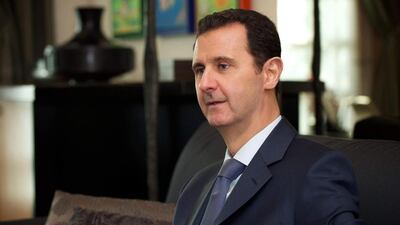A point repeatedly made throughout the Syrian conflict is that Washington cannot expect to have influence without providing necessary military and political aid. The irony is that the latest person to make this point powerfully is none other than president Bashar Al Assad. In his interview with Foreign Affairs magazine on Monday, he said: “That’s the problem with the Americans and with the West – they want to have influence without cooperation.” The opposition could not have said it better.
After nearly four years of conflict, the reluctance, inconsistencies and incoherence in Washington have led to a situation far more complex than it might have been if approached more decisively earlier. Even worse, the US now appears to have abandoned its stated policy of regime change in Syria. Mr Al Assad can now be part of Syria’s future. But the simple fact is that this is a profoundly misguided shift and it will create an even more complex situation. If the US is willing to live with Mr Al Assad, it might as well be also willing to accept jihadists as a fact of life in Syria and Iraq.
For a start, the new statements about the fate of Mr Al Assad serve no good purpose. The Assad regime will not change its stance because the Obama administration will no longer send non-lethal aid to the rebels or organise a conference for the political opposition. It will hope the new American attitude will be reflected in pressure on Turkey to close its borders and on the Gulf states to halt any financial help to the rebels.
The pretence of regime change at least helped the moderate forces justify cooperation with foreign countries against extremists. They are now in a much weaker position to do that, as they will be seen as nothing more than foreign stooges. To understand how such calculations affect the dynamics on the ground, one should compare the rebels’ attitudes before and after the air strikes against ISIL began in Syria. Before the campaign started, multiple rebel coalitions were in place and they pledged to take the fight to ISIL-controlled territory. When the international coalition showed it had no real strategy and that the strikes targeted regime opponents other than ISIL and, in some places, even aided the regime troops, including in Deir Ezzor, there was a sudden silence on rebel-ISIL lines.
Washington’s new aimless stance will worsen the situation. What matters is not whether a few thousand fighters are willing to be trained to fight ISIL, but whether these fighters will be viewed as liberators or mercenaries. Increasingly, the latter categorisation seems more likely and so these fighters will probably face resistance from the local population, something that will favour ISIL.
Even if Mr Al Assad is now willing to cooperate with the West, he will still be incapable of sending troops to fight ISIL. He does not have the military resources or the popular support to do so. The rebels will be better positioned to do the job, if there is a clear strategy and reassurance that sufficient resources and support will not be cut off at will. They need to know that they will not be left to fight ISIL on their own, as happened in northern and eastern Syria last year.
Areas under the full control of the regime do not face a real jihadist threat. Even in disputed areas along the front lines, such as outside Damascus, the demise of rebel forces will give rise to ISIL and Jabhat Al Nusra as the other rebels’ forces are in control and have some legitimacy. So if jihadism is Washington’s fixation, it is the rebels that require help and this can only be effective if their political and military demands are met.
The way forward is a more nuanced look at the conflict as it is today. As former foreign ministry spokesman Jihad Makdissi told a Lebanese television channel this week, the opposition’s focus on toppling the regime is absurd because the regime is no longer the same. Syria is ever more fractured so the discussion should be focused on the shape of the new state and how to put it together. A related remark Mr Al Assad made during his Foreign Affairs interview is worth noting: “The population [across Syria] still supports the state regardless of whether they support it politically or not.” It is a significant departure from his earlier statements, that a military solution is possible. It is recognition that there is a deep political crisis, which does need to be tackled, even if he still thinks he is above any solution.
The opposition, the regime and their backers should work out a process by updating their understanding of the conflict. The opposition cannot hope to relocate to Damascus and take control. The regime cannot roll back its army to eastern, northern and southern Syria. Foreign countries would be deluded to hope that extremism can be uprooted without addressing the political and social roots of this crisis.
Hassan Hassan is an analyst with the Delma Institute
On Twitter: @hxhassan

